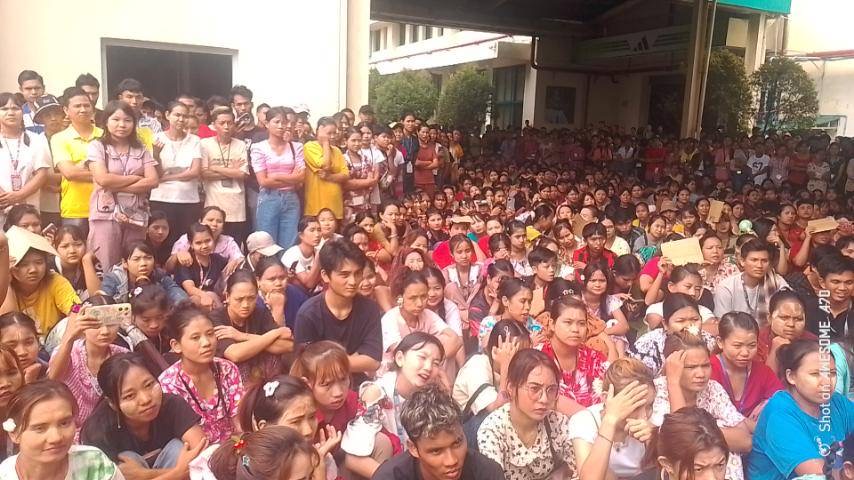Because their employer paid them wages so low that they could not cover their basic needs, such as food and housing, some 4,000 garment workers at the Tsang Yih Co. factory in Yangon, Myanmar, recently went on strike. Through collective action, the workers gained leverage at the bargaining table and ultimately succeeded in negotiating a new collective agreement that benefited them and their families.
Garment workers were assisted in their effort for better pay by the Federation of General Workers of Myanmar (FGWM), a Solidarity Center partner, and defied the risks involved in the country where a military coup took power in February 2021.
The right to organize and form or join unions, to bargain collectively and, if necessary, to strike, are core trade union rights. They have also been recognized as fundamental labor rights under international law. Employers have opposed the right to strike for decades and, since 2012, have denied the existence of an international right to strike, despite having recognized it for decades. To settle the matter, workers are making their case before the International Court of Justice.
The right to strike is the difference between workers having a voice or being silenced—and the International Court of Justice’s decision will help determine whether that right is protected for workers everywhere, a cornerstone of democracy that ensures ordinary people can hold employers and governments accountable and prevents power from becoming too concentrated in the hands of the few.
The International Court of Justice is the United Nations’ highest court, and its rulings shape international law and set standards governments around the world are expected to follow.
Fundamental to Workers’ Democratic Freedoms
Since its passage in 1948, International Labor Organization (ILO) Convention 87, a treaty, has been interpreted to protect the right of workers to strike. Convention 87 is also one of the most widely ratified, with 158 countries having endorsed it..
Last year, the parties submitted their written arguments as to whether Convention 87 protects the right to strike, and starting on October 6, the International Court of Justice (ICJ) will hear oral arguments from the ILO, workers, employers and several governments.
“That the right to strike is protected by the right to freedom of association is not in serious doubt, as this has been the consistent understanding of the ILO for more than 70 years,” said Jeff Vogt, Solidarity Center Rule of Law director and Chair of the ILAW Network.
“The court’s advisory opinion is an important opportunity to reassert this long-standing right and put an end to this disruptive dispute brought on by the employers.” Vogt is supporting the ITUC’s legal team in the case and will participate in the proceedings at The Hague. Vogt is also co-author of the book, The Right to Strike in International Law.
However, as former UN Special Rapporteur on the Right to Peaceful Assembly and Association Maina Kiai, explained, the importance of the right to strike goes well beyond the workplace.
“[P]rotecting the right to strike is not simply about countries fulfilling their legal obligations. It is also about them creating democratic and equitable societies that are sustainable in the long run. The concentration of power in one sector—whether in the hands of government or business—inevitably leads to the erosion of democracy, and an increase in inequalities and marginalization with all their attendant consequences. The right to strike is a check on this concentration of power.”
The landmark case is the first time the ICJ is interpreting an international labor convention. Its advisory opinion will have wide-ranging implications for workers and trade unions around the world.
The ILAW Network will post daily recaps on the oral arguments as well as interviews with the lawyers arguing this case. Follow ILAW coverage on Instagram (ilaw.network) to access videos and Twitter (@ILAW_Network) for written daily recaps.

